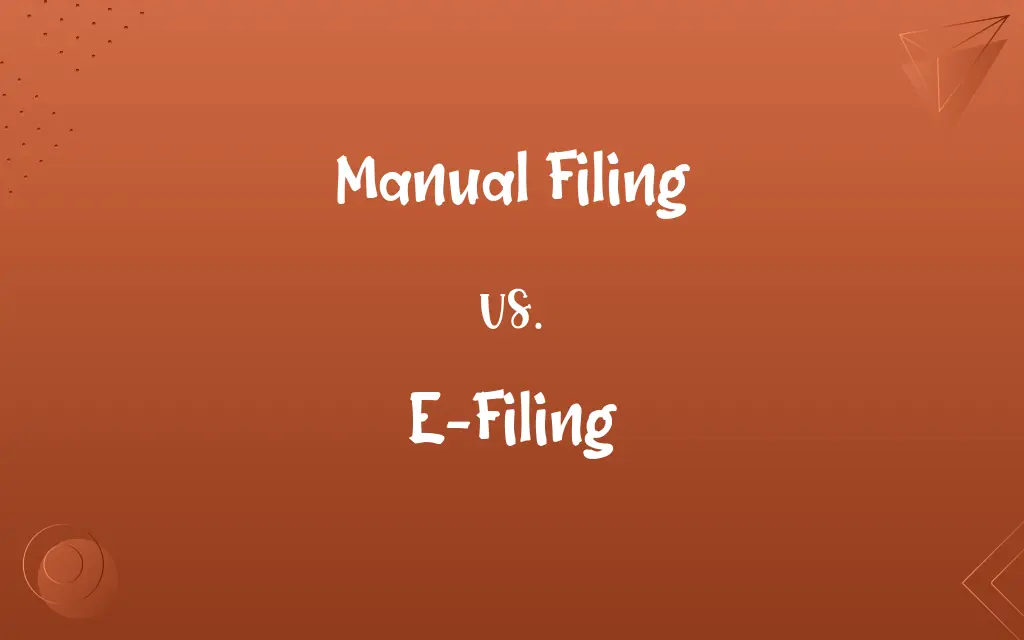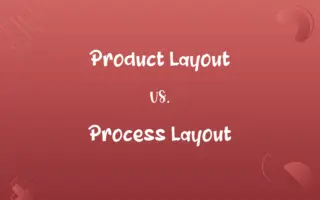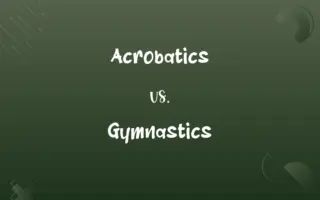Manual Filing vs. E-Filing: Know the Difference

By Shumaila Saeed || Published on January 21, 2024
Manual Filing involves physically submitting documents, often in paper form. E-Filing is the process of submitting documents electronically, often through dedicated platforms or email.

Key Differences
Manual Filing typically requires physical handling and delivery of documents, often in paper format, to a specific location. E-Filing, in contrast, is done digitally, with documents submitted via the internet, saving time and physical resources.
Shumaila Saeed
Jan 21, 2024
Manual Filing can be more time-consuming, with a longer processing time due to physical transit and manual handling. E-Filing offers quicker processing, as it eliminates the need for physical transit and often has automated system checks.
Shumaila Saeed
Jan 21, 2024
In Manual Filing, there's a higher risk of documents being lost or damaged in transit. E-Filing is generally more secure, with digital records that are less susceptible to physical damage and can be backed up.
Shumaila Saeed
Jan 21, 2024
Manual Filing often requires storage space for physical documents, which can be cumbersome over time. E-Filing, however, utilizes digital storage, which is more space-efficient and easier to organize and search through.
Shumaila Saeed
Jan 21, 2024
Accessibility differs significantly; manual files are accessible only from their physical location, while e-files can be accessed remotely, enhancing convenience and efficiency.
Shumaila Saeed
Jan 21, 2024
ADVERTISEMENT
Comparison Chart
Method of Submission
Physical handling and delivery of paper documents
Digital submission via internet
Shumaila Saeed
Jan 21, 2024
Processing Time
Longer due to manual handling
Quicker with automated processes
Shumaila Saeed
Jan 21, 2024
Security and Risk
Risk of loss or damage in transit
Secure with digital records and backups
Shumaila Saeed
Jan 21, 2024
Storage Needs
Requires physical storage space
Utilizes digital storage, saving physical space
Shumaila Saeed
Jan 21, 2024
ADVERTISEMENT
Manual Filing and E-Filing Definitions
Manual Filing
Paper-based document processing.
Manual filing of invoices involved organizing numerous folders.
Shumaila Saeed
Jan 08, 2024
E-Filing
Digital processing of documents.
E-filing of the application was more efficient than mailing it.
Shumaila Saeed
Jan 08, 2024
Manual Filing
Submitting documents in physical form.
She went to the courthouse for manual filing of the legal paperwork.
Shumaila Saeed
Jan 08, 2024
E-Filing
Submitting documents electronically via the internet.
He completed his tax returns through e-filing.
Shumaila Saeed
Jan 08, 2024
Manual Filing
Traditional method of document submission.
Manual filing was the standard process before digital alternatives.
Shumaila Saeed
Jan 08, 2024
ADVERTISEMENT
E-Filing
Electronic submission of records to an authority.
The court now accepts e-filing for most documents.
Shumaila Saeed
Jan 08, 2024
Manual Filing
Physical submission of records to an authority.
The company's tax returns were due for manual filing.
Shumaila Saeed
Jan 08, 2024
E-Filing
Utilizing online platforms for document submission.
E-filing made it easier to submit her claim to the insurance company.
Shumaila Saeed
Jan 08, 2024
Manual Filing
Handling and storing paper documents.
Manual filing required significant office space for file cabinets.
Shumaila Saeed
Jan 08, 2024
E-Filing
Modern method of digital document handling.
E-filing is the preferred method for many legal and financial transactions.
Shumaila Saeed
Jan 08, 2024
E-Filing
The use of computer technology to file documents (in a legal case, a patent application, etc.).
Shumaila Saeed
Jan 06, 2024
Repeatedly Asked Queries
What are the benefits of e-filing?
E-filing is faster, more secure, and more convenient.
Shumaila Saeed
Jan 21, 2024
How does e-filing work?
It involves submitting documents electronically, usually online.
Shumaila Saeed
Jan 21, 2024
Can I access e-filed documents remotely?
Yes, they are accessible from anywhere with internet access.
Shumaila Saeed
Jan 21, 2024
Do I need a lot of storage for manual filing?
Yes, it requires space for physical documents.
Shumaila Saeed
Jan 21, 2024
Is manual filing still common?
It's less common now but still used in some cases.
Shumaila Saeed
Jan 21, 2024
Do I need special software for e-filing?
Sometimes, depending on the type of documents and platform.
Shumaila Saeed
Jan 21, 2024
Is manual filing time-consuming?
Yes, it often takes more time due to physical handling.
Shumaila Saeed
Jan 21, 2024
Can manual filing lead to document loss?
Yes, there's a higher risk of documents being lost or damaged.
Shumaila Saeed
Jan 21, 2024
Can I manually file documents online?
No, manual filing specifically refers to physical document submission.
Shumaila Saeed
Jan 21, 2024
Is manual filing better for confidential documents?
Not necessarily, as both methods have security measures.
Shumaila Saeed
Jan 21, 2024
Can I track my e-filed documents?
Yes, most e-filing systems have tracking capabilities.
Shumaila Saeed
Jan 21, 2024
Is e-filing environmentally friendly?
Yes, it reduces the need for paper, thus being more eco-friendly.
Shumaila Saeed
Jan 21, 2024
How quickly can I process documents with e-filing?
E-filing is usually much quicker than manual filing.
Shumaila Saeed
Jan 21, 2024
Are there any risks with e-filing?
The main risks involve data privacy and security online.
Shumaila Saeed
Jan 21, 2024
Is manual filing more expensive?
It can be, due to printing, storage, and mailing costs.
Shumaila Saeed
Jan 21, 2024
Do government agencies prefer e-filing?
Many do, for its efficiency and reduced paperwork.
Shumaila Saeed
Jan 21, 2024
How do I start e-filing?
Typically, you'll need to register on an online platform or portal.
Shumaila Saeed
Jan 21, 2024
Can I switch from manual to e-filing easily?
Yes, in most cases, the transition is straightforward.
Shumaila Saeed
Jan 21, 2024
Share this page
Link for your blog / website
HTML
Link to share via messenger
About Author
Written by
Shumaila SaeedShumaila Saeed, an expert content creator with 6 years of experience, specializes in distilling complex topics into easily digestible comparisons, shining a light on the nuances that both inform and educate readers with clarity and accuracy.































































